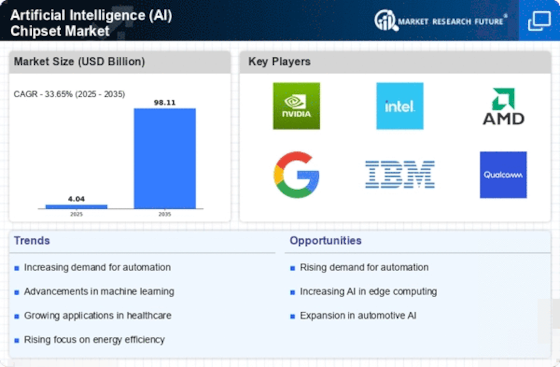Top Industry Leaders in the Artificial Intelligence Chipset Market

The Competitive Landscape of the Artificial Intelligence (AI) Chipset Market
The artificial intelligence (AI) chipset market, encompassing specialized hardware designed to accelerate AI workloads, is at the forefront of technological revolution. Fueled by the exponential growth of AI applications across industries, this dynamic landscape sees established tech giants battling it out with nimble startups, all vying for a share in this rapidly expanding domain.
Some of the Artificial Intelligence (AI) Chipset companies listed below:
- NVIDIA Corporation
- Intel Corporation
- Xilinx, Inc.
- Samsung Electronics Co., Ltd.
- Micron Technology, Inc.
- Qualcomm Technologies, Inc.
- International Business Machines Corporation
- Google Inc.
- Microsoft Corporation
- Amazon Web Services
Strategies Adopted by Leaders
- Portfolio Diversification: Offering a diverse range of AI chipsets catering to various computing needs, from high-performance data center solutions to edge computing devices, expands market reach and attracts different customer segments.
- Technological Prowess and Architecture Innovation: Continuous investment in R&D focuses on pioneering advancements in areas like neural processing units (NPUs), tensor cores, and specialized memory architectures, ensuring cutting-edge performance and efficiency for AI workloads.
- Software and Ecosystem Integration: Developing software development kits (SDKs), driver optimization, and compatibility with popular AI frameworks like TensorFlow and PyTorch fosters a comprehensive ecosystem, attracting developers and AI application creators.
- Strategic Partnerships and Acquisitions: Collaborations with AI software developers, cloud service providers, and hardware manufacturers broaden their reach, accelerate technology integration, and access new markets.
- Focus on Energy Efficiency and Sustainability: Developing energy-efficient AI chipsets with features like on-chip voltage regulation and dynamic power management caters to growing environmental concerns and data center needs.
Factors for Market Share Analysis:
- Performance and Efficiency: Delivering high processing power, low latency, and optimal energy consumption for AI workloads sets players apart and caters to various application demands.
- Software and Ecosystem Compatibility: Seamless integration with existing software frameworks, operating systems, and hardware platforms attracts developers and facilitates faster AI application development.
- Cost-Effectiveness and Price Point: Striking a balance between performance, features, and competitive pricing is crucial for attracting budget-conscious customers and expanding market penetration.
- Brand Reputation and Customer Support: A trusted brand image built on reliable chipsets, robust technical support, and proven performance in AI applications fosters customer loyalty and repeat purchases.
- Focus on Specific Applications and Verticals: Targeting specific sectors like autonomous vehicles, robotics, or healthcare with specialized AI chipsets caters to niche markets and unlocks new growth opportunities.
New and Emerging Companies:
- Niche Market Focus: Targeting specific segments like low-power AI chipsets for edge devices, AI accelerators for mobile applications, or customized solutions for industrial automation creates new market openings.
- Open-source Hardware and Software: Utilizing open-source hardware designs and software frameworks allows them to offer cost-effective solutions and attract developers seeking greater flexibility and customization.
- Direct-to-Customer Online Sales: Leveraging online platforms and social media marketing enables them to bypass traditional distribution channels and reach customers directly, often at competitive prices.
- Focus on Emerging Technologies: Integrating technologies like quantum computing, neuromorphic computing, or specialized memory architectures positions them at the forefront of future AI hardware advancements.
Industry Developments:
October 2023- Qualcomm's newest and most powerful smartphone processor, Snapdragon 8 Gen 3, was recently unveiled. The new chipset promised to provide consumers with best-in-class power economy alongside higher CPU performance, improved graphics performance, and AI-enhancements. It has a more powerful graphics processing unit (GPU), a quicker modem, and enhanced network capabilities. The new flagship processor from Qualcomm also has enhanced in-device security. The enhanced built-in AI functions are the most notable improvement of the Snapdragon 8 Gen 3 CPU. According to Qualcomm, the chipset incorporates high-performance AI throughout the whole system to provide top-tier AI performance. Many high-end Android phones throughout the world will soon be equipped with the new processor. Manufacturers of original equipment are about to release high-end smartphones built on this chipset.
June 2023- Advanced Micro Devices (AMD) unveiled a cutting-edge GPU designed specifically for use in AI workloads. The MI300X processor is positioned to combat NVIDIA GPUs head-on in the artificial intelligence (AI) computing industry. Companies who want to create products like ChatGPT need GPU chips like these. Since AMD is more recognized for its standard computer processors, the success of the MI300X's marketing might open up a hitherto untapped market for the business. With its CDNA architecture, the new AMD MI300X supports up to 192 GB of memory and 80 billion parameters in its largest language models. In addition, the firm stands to gain from its collaboration with Microsoft by developing special products for the software giant.









